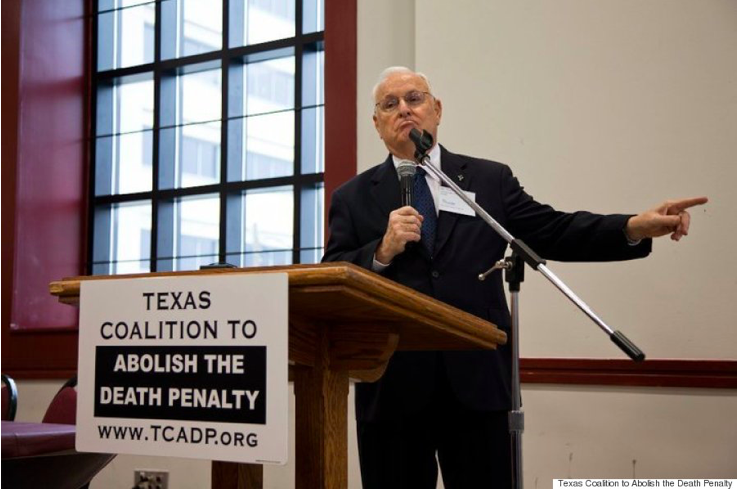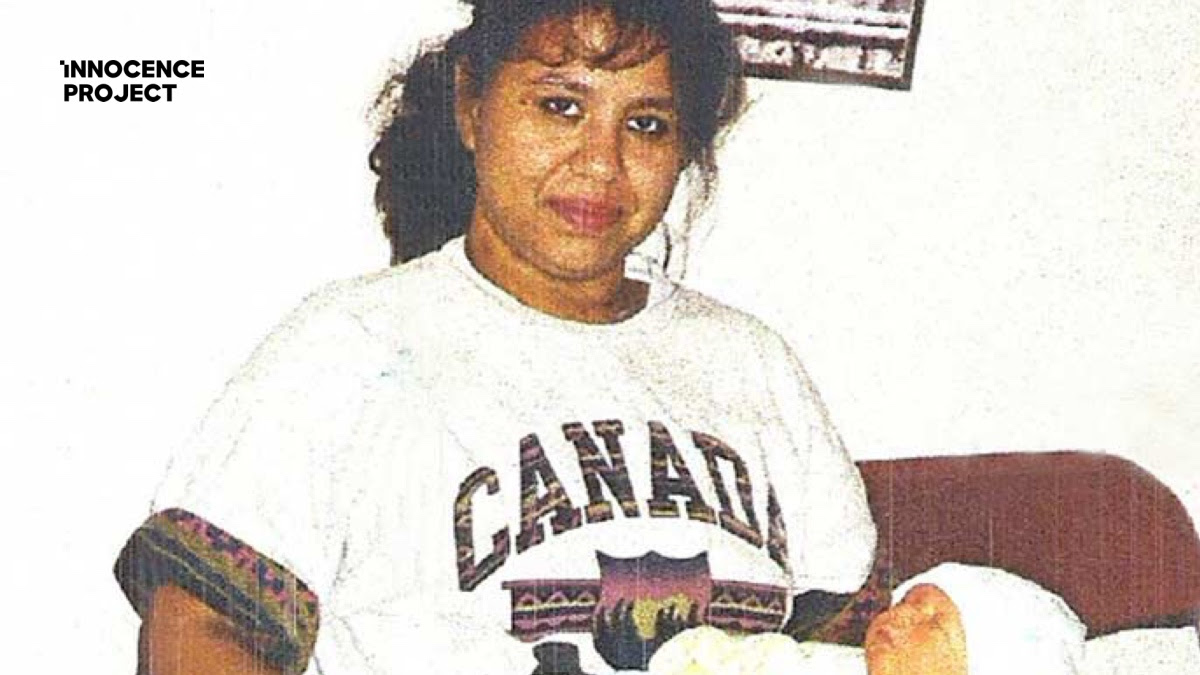In this edition
Scheduled executions: Texas set to execute a 78-year-old man and a wrongfully convicted woman this month
In case you missed it: Texas court overturns conviction and death sentence of Joseph Colone; Tarrant County prosecutors remove death penalty as a punishment option on the eve of trial; U.S. Supreme Court upholds the religious rights of those facing execution in Texas; Scottish court refuses extradition based on prison conditions in Texas
Featured events: Save the date for the next TCADP Book Group meeting
In memory of Reverend Carroll “Bud” Pickett
Just hours before sending out this newsletter, we learned of the passing of our dear friend, Reverend Carroll “Bud” Pickett. As the chaplain at the Walls Unit in Huntsville, Rev. Pickett bore witness to the resumption of executions in Texas in 1982 and provided spiritual comfort to 95 men in the hours before they were put to death by the State. He later wrote a book about his experiences, Within These Walls, and was featured in the documentary film, “At the House Door.” Several years ago, he testified in front of the Texas House Criminal Jurisprudence Committee about the toll that witnessing executions had taken on him and others; you could hear a pin drop in the room as he concluded his powerful remarks. We will offer more reflections on Rev. Pickett in the coming days. We express our sincere condolences to his wife, Jane, his family, and everyone whose life he touched. We will miss him greatly.

Quote of the month
“Filling another coffin doesn’t do anything to bring our loved ones back, it just widens the circle of pain.”
– New Hampshire State Representative Robert “Renny” Cushing, who passed away on March 7, 2022, in a podcast for the Death Penalty Information Center. As the survivor of a homicide victim, Renny led his state to abolish the death penalty in 2019. We mourn his loss and express gratitude for the great privilege of knowing him and working together to advance justice.
After more than six months without an execution, the State of Texas is set to put two people to death this month unless those with the power to do so intervene. Take action today to support clemency for Carl Wayne Buntion and Melissa Lucio.
Support clemency for Carl Wayne Buntion
On April 21, 2022, the State of Texas is scheduled to execute Carl Wayne Buntion, who just turned 78 years old. Buntion was convicted and sentenced to death in 1991 for killing Houston Police Officer James Irby. If executed, he will be the oldest person put to death by the State of Texas.
It would be a gross spectacle for the State to execute this frail, elderly man who has spent more than thirty years on death row without posing a threat to anyone and suffers from numerous physical health ailments. Such an execution embodies the 8th Amendment’s prohibition on the imposition of cruel and unusual punishment.
Buntion has filed an application for clemency with the Texas Board of Pardons and Paroles and Governor Greg Abbott seeking the commutation of his death sentence to a lesser penalty or a 90-day reprieve so his attorneys can pursue litigation related to his request for his spiritual advisor to pray aloud with him and offer physical comfort in the execution chamber (read below for recent developments with spiritual advisor issues).
Email the members of the Texas Board of Pardons and Paroles by Monday, April 18, 2022 to urge clemency or at least a reprieve for Carl Wayne Buntion using these talking points (you will also find a sample email message and contact information at that link).
#SaveMelissaLucio

Image courtesy of the Lucio family / Innocence Project.
Melissa Lucio faces execution on April 27, 2022. If it proceeds, it would be the first execution of a Latina in the United States since the resumption of the death penalty in the 1970s and would cause tremendous suffering for her family. Melissa was wrongfully convicted and sentenced to death in 2008 after her two-year-old daughter, Mariah, sustained injuries from an accidental fall. Although Melissa repeatedly told the police that she did not kill her daughter, they continued to interrogate her for five hours until she agreed, falsely, to take responsibility for some of her daughter’s injuries.
On March 22, 2022, attorneys for Melissa submitted an application for clemency to Governor Greg Abbott and the Texas Board of Pardons and Paroles. The application includes the declarations of seven nationally recognized experts, including experts in false confessions and medical and forensic experts, who reviewed the evidence and concluded that Melissa’s conviction was based upon an unreliable “confession” and unscientific, false evidence that misled the jury about the cause of Mariah’s death.
The clemency application also includes declarations from four jurors stating they have grave concerns about evidence withheld from them at Melissa’s capital trial and would support relief, as well as letters of support from hundreds of Texas anti-domestic violence groups, Baptist, Evangelical and Catholic leaders, Latino organizations, and exonerees of wrongful convictions. Struck by the sentencing disparity and grave doubts about the reliability of Melissa’s conviction, a bipartisan group of more than 80 members of the Texas House of Representatives opposes Melissa’s execution.
You can do three things right now to save Melissa! Go to https://innocenceproject.org/ways-to-help-melissa-lucio-innocent-woman-executed-april-27-texas/ to take these actions:
1. Sign the petition.
2. Contact Governor Abbott and the Texas Board of Pardons and Paroles to support clemency for Melissa.
3. Contact the Cameron County District Attorney to ask him to withdraw the execution date.
For updates on these cases and additional opportunities to raise your voice in opposition to executions, follow TCADP on social media and visit our website.
Texas court overturns conviction and death sentence of Joseph Colone
On March 2, 2022, the Texas Court of Criminal Appeals overturned the conviction of Joseph Colone, who was sentenced to death in Jefferson County (Beaumont) in 2017 for killing Mary Goodman, 41, and her 16-year-old daughter, Briana Goodman, in 2010. The court found that the State suppressed material evidence showing the DPS Crime Laboratory had mishandled evidence prior to DNA testing, violating Colone’s right to due process, and that a witness for the State had provided false testimony. The case has been remanded to Jefferson County.
Tarrant County prosecutors take death penalty off the table after multiple delays and an earlier mistrial in the case of Reginald Kimbro
On March 17, 2022, just days before his capital murder trial was set to begin in Tarrant County, Reginald Kimbro pleaded guilty to the 2017 murders of Molly Matheson and Megan Getrum as well as three sexual assaults in Collin County and an aggravated sexual assault in Cameron County. Prosecutors had planned to seek the death penalty for Kimbro. In the summer of 2020 they attempted to move forward with a jury trial but the judge declared a mistrial because of the pandemic. Kimbro was sentenced to life in prison without the possibility of parole.
No one has been sentenced to death in Texas to date in 2022, though several capital trials are scheduled as courts address the backlog of judicial proceedings caused by the pandemic. In 2021, Texas jurors sentenced three people to death.
U.S. Supreme Court rules in favor of religious rights of those facing execution
On March 24, 2022, the U.S. Supreme Court released its 8-1 opinion in Ramirez v. Collier in which it upheld the religious rights of individuals facing execution in Texas. Last fall, the Court issued a stay of execution to John Ramirez and agreed to consider his claim that the Texas Department of Criminal Justice is violating his right to exercise his religious beliefs by prohibiting his spiritual advisor from laying hands upon him or praying aloud during his execution. The Justices heard oral arguments in the case on November 9, 2021.
In their opinion, the Justices found that “Ramirez is likely to succeed on his RLUIPA claims because Texas’s restrictions on religious touch and audible prayer in the execution chamber burden religious exercise and are not the least restrictive means of furthering the State’s compelling interests.” (RLUIPA is the Religious Land Use and Institutionalized Persons Act of 2000.) In her analysis, Amy Howe of SCOTUSblog notes that “The decision in Ramirez v. Collier was the latest chapter in the nearly three-year-long dispute over the presence of spiritual advisers at executions…” According to the Texas Tribune, Texas prison officials said in a statement that the agency “respected the court’s decision and will be making appropriate modifications to our practices to align with today’s ruling.”
Prison conditions in Texas impact justice abroad
Last year, a court in Scotland refused extradition of a Scottish man, Daniel Magee, to Texas, citing poor prison conditions in Texas that might constitute international human rights violations. In the case, the court held that Texas prisons violated Article III of the European Convention on Human Rights, which bans torture and “inhuman or degrading treatment or punishment.” Magee’s case adds to a history of instances in which countries refused or seriously considered refusing extradition over human rights concerns, most often relating to the use of the death penalty in United States. Read this piece by Keri Blakinger of The Marshall Project to learn how the Texas prison system impacts the administration of justice abroad.
The TCADP Book Group meets every six to eight weeks on Zoom and reads a mix of fiction, non-fiction, and memoirs. When possible, we invite the authors to join us. Our next meeting will take place on Wednesday, June 1, 2022 at 7:30 PM Central Time, when we will discuss Junk Science and the American Criminal Justice System by M. Chris Fabricant of the Innocence Project. Register here!
TCADP 2022 Media Award recipient, Maurice Chammah, will participate in a book reading on May 12, 2022 at Interabang Books in Dallas. Maurice is the author of Let the Lord Sort Them: The Rise and Fall of the Death Penalty, which the TCADP Book Group read together last year and is now available in paperback.
